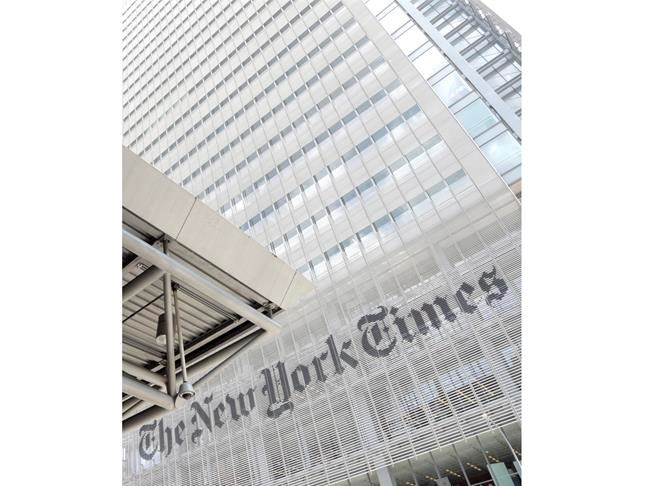NEW YORK — In an embarrassing about-face, The New York Times said Thursday that an opinion piece it ran by U.S. Sen. Tom Cotton advocating the use of federal troops to quell nationwide protests about police mistreatment of black Americans did not meet its standards.
Cotton's op-ed, titled “Send in the Troops” and first posted online late Wednesday, caused a revolt among Times journalists, with some saying it endangered black employees. Some staff members called in sick Thursday in protest.
The Times said in a statement that a “rushed editorial process” led to publication of a piece that did not meet its standards.
Cotton taunted the paper on Twitter Thursday night, accusing it of “surrendering to the mindless woke mob.”
The Arkansas Republican’s piece remained on the Times’
Earlier Thursday, Times publisher A.G. Sulzberger and editorial page editor James Bennet defended its publication, saying they believed it was important to discuss controversial ideas in a public forum rather than keep them quiet.
But, the Times reported that later, Bennet revealed that he had not read Cotton's piece prior to its publication.
“As a result, we’re planning to examine both short term and long term changes” to its opinion pages including expanding its fact-checking operation and reducing the number of op-eds, which are opinion pieces written by outside contributors that it publishes, the Times said its statement.
Cotton's column supported President Donald Trump's call to bring in federal troops to stop violence associated with protests against police treatment of minorities. He denounced “nihilist criminals” out for loot and “left-wing radicals like antifa infiltrating protest marches to exploit (George) Floyd's death for their own anarchic purposes.”
However, it was pointed out online that a Times news story on June 1 said “conservative commentators are asserting with little evidence that antifa, the far-left anti-fascism activist movement
Among the Times journalists who had protested publication of Cotton's piece was Nikole Hannah-Jones, who last month won a Pulitzer Prize for her magazine piece, “The 1619 Project,” about black Americans since the first arrival of slaves.
“As a black woman, as a journalist, I am deeply ashamed that we ran this,” Hannah-Jones tweeted.
Cotton’s piece was posted online two days after a peaceful demonstration outside the White House was cleared with tear gas and flash bangs, clearing the way for President Donald Trump to stage a photo-op outside a nearby church.
Bennet had written that he personally disagreed with Cotton and believed troops could lead to innocent people being hurt. The Times’ opinion page had published several pieces with that view, he said.
“Readers who might be inclined to oppose Cotton’s positions need to be fully aware of it, and reckon with it, if they were to defeat it,” Bennet wrote in an essay. “To me, debating influential ideas openly, rather than letting them go unchallenged, is far more likely to help society reach the right answers.”
Still, he said, “I know that my own view might be wrong.”
Also Thursday, the Philadelphia Inquirer apologized for a “horribly wrong” decision to use the headline “Buildings Matter, Too” on an article. Some 30 members of its 210-member editorial staff had called in sick Thursday following the mistake, which black staff members angrily condemned.
The twin uprisings illustrated raw feelings unleashed by the video of George Floyd dying last week after a Minneapolis police officer pressed a knee against his neck, along with long-time concerns about whether newspaper staffs reflect the makeup of their communities.
The Inquirer headline was over a piece by architecture critic Inga Saffron, who worried that buildings damaged in violence over the past week could “leave a gaping hole in the heart of Philadelphia.”
After the initial headline, considered diminishing to the Black Lives Matter movement, the Inquirer whiffed on an online replacement, writing, “Black Lives Matter. Do Buildings?”
Eventually, the newspaper settled on “Damaging buildings disproportionately hurt the people protesters are trying to uplift.”
Features reporter Brandon Bell wrote on Twitter that he was calling in “sick and tired” to work. He was among those who distributed an open letter of protest, saying African American journalists were tired of careless mistakes that make it harder to do their jobs and, at worst, put lives at risk.
“We're tired of shouldering the burden of dragging this 200-year-old institution kicking and screaming into a more equitable age,” the letter read. “We're tired of being told to show both sides of issues there are no two sides of.”
The Inquirer published an apology from top editors. Publisher and CEO Lisa Hughes said in a memo to staff that no one would be charged a sick day for taking Thursday off. She called the headline “offensive and inappropriate” and said the Inquirer needed a more diverse staff.
___
Business Writer Tali Arbel in New York contributed to this report.
David Bauder, The Associated Press




